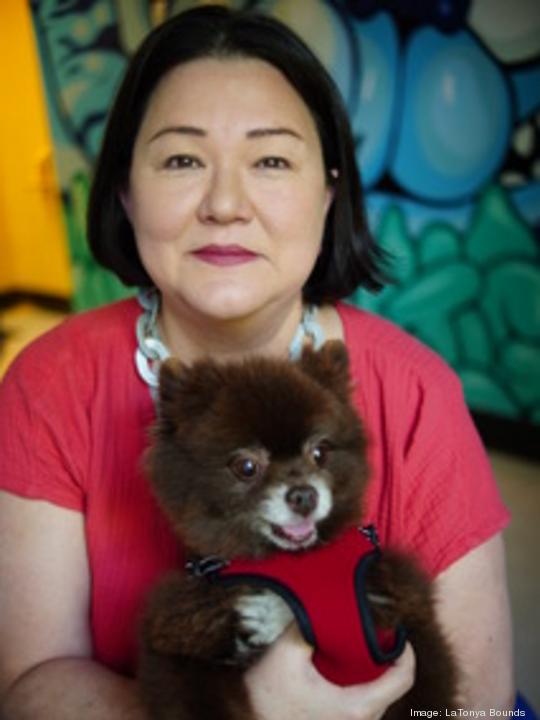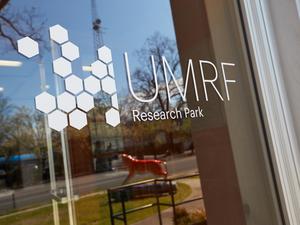
Leta Nutt has four male Pomeranians, all from the same litter: Bear, Chewy, Carbon, and Ash.
And each morning, as she wakes up, has coffee with her husband, and receives hugs and kisses from her dogs — or “fluffy babies,” as she calls them — Nutt is reminded why she’s undertaken such a challenging professional task: helping solve a rampant, worldwide stray animal issue.
“I’m just a dog mom who happens to be a scientist,” Nutt said. “And I wanted to fix this problem.”
She is the founder of Nutt Bio, a local startup that’s developing single-injection chemical sterilants for male dogs, cats, and piglets. If successful, her product — which is injected into the testes and involves a five-minute procedure time — could replace the traditional method of neutering, a practice that typically involves removing the testes altogether.
The neutering surgery is more costly, less practical, and less accessible; and the lack of a simpler solution is in part what’s led to the widespread stray animal problem. According to PETA, there are about 70 million stray dogs and cats in the U.S. — though Nutt estimates it’s closer to 50 million — and animal shelters take in roughly 6 million animals every year.
Nutt started her company within the Patents2Products (P2P) program, a partnership between U of M and Epicenter that hires post-doc fellows to start businesses, using patented intellectual property developed both in Memphis and across the U.S.
The $1 million cost of the initiative is split between the U of M and Epicenter, and the organizations provide researchers with two-year funded positions along with resources to launch startups.
For example, participants get a salary with benefits, an on-campus lab, space at the University of Memphis Research Foundation's research park — a coworking facility for startups — and mentorship.
That mentorship is key, as it’s the financial side of starting a company that Nutt struggles with.
“Most people would think developing a chemical sterilant that works is going to be impossible; that’s actually the easy part of what I’m doing,” she said. “I have more than 25 years of research experience, that’s my forte. It’s the business part that’s going to be more difficult for me.”
Nutt’s product, eventually, would require approval from the U.S. Food and Drug Administration (FDA), a process that can cost millions of dollars; so, Nutt will need to lure in a significant amount of investment.
“The limitation is money; I have to de-risk the investment for investors,” she said. “The stronger the proof of principle, and the more I iron it out … the more investors are going to be attracted and fund my FDA trials.”
Nutt is banking on her ample experience to help strengthen that proof of principle.
After receiving her Ph.D. in cancer biology from the University of Texas MD Anderson Cancer Center, and she did post-doctoral research at Duke University and the Karolinska Institute in Sweden. That was before she took a faculty position at St. Jude Children’s Research Hospital — which she left in 2017.
She said she's learned a lot over the years — including how to kill cancer, egg, and sperm cells through blocking metabolic pathways — and now, she’s applying that research to her current work.
“I’m using my expertise in cancer biology, and how cells die, to approach this question, in the testes,” she said.
Nutt is still in the early stages, and so far, through tests, knows she can sterilize male rats, for at least a month — a long way off from the goal of being able to permanently sterilize cats, dogs, and piglets, but a step in that direction.
Next year, she hopes to start testing on her target animals, and the plan is to actually develop two sterilants: one for pet dogs and cats, and one for piglets and feral cats that are caught, sterilized, and released.
The one for piglets hopes to also completely remove testosterone, preventing aggression as well as “boar taint,” which ruins meat. This also could prevent significant pain, as the common practice is to castrate piglets without anesthesia.
For feral cats, it aims to prevent roaming, spraying, and fighting.
The project is undertaking a difficult task, but one she isn’t backing away from.
“I’m very passionate about what I’m doing,” she said. “I could go get another academic position at a university, but I don’t want to do that. I want to help these guys. … I’ve basically decided that my next chapter in life is solving this problem."









